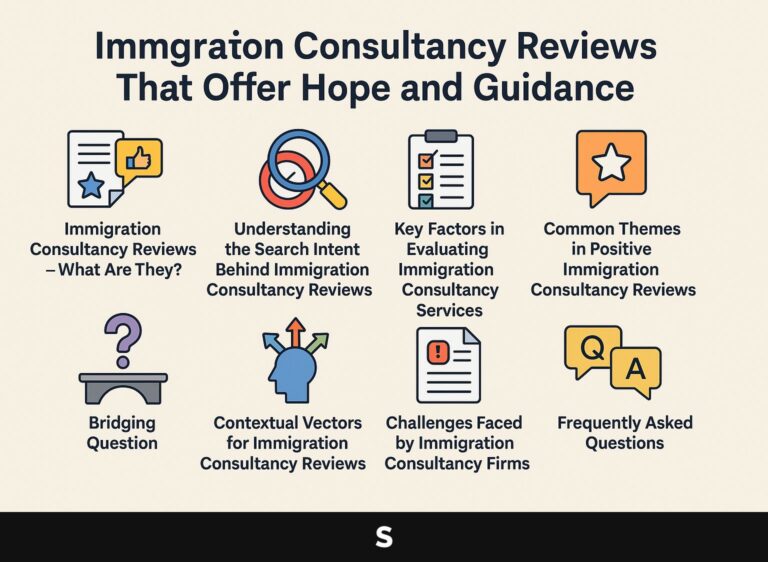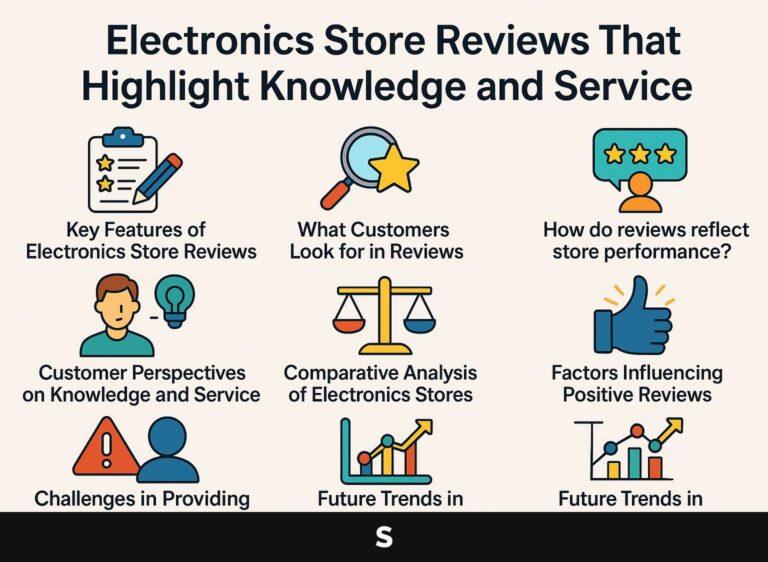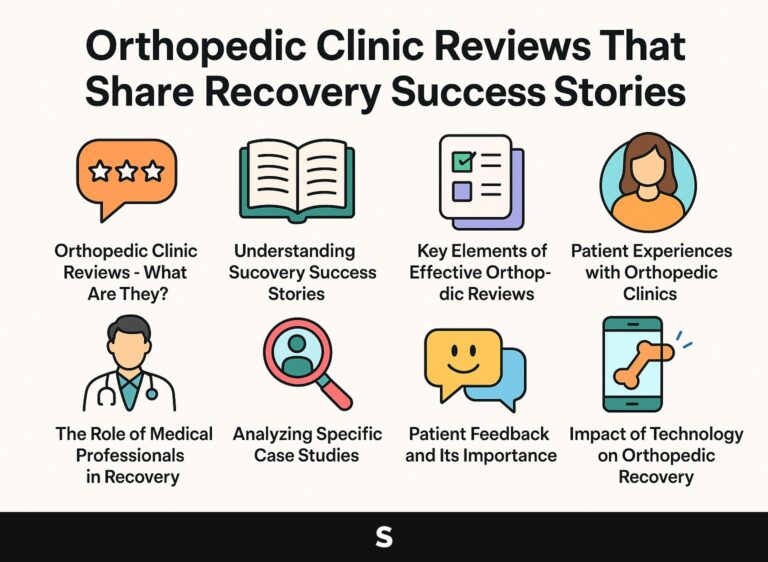Medical Clinic Reviews That Highlight Compassionate Care
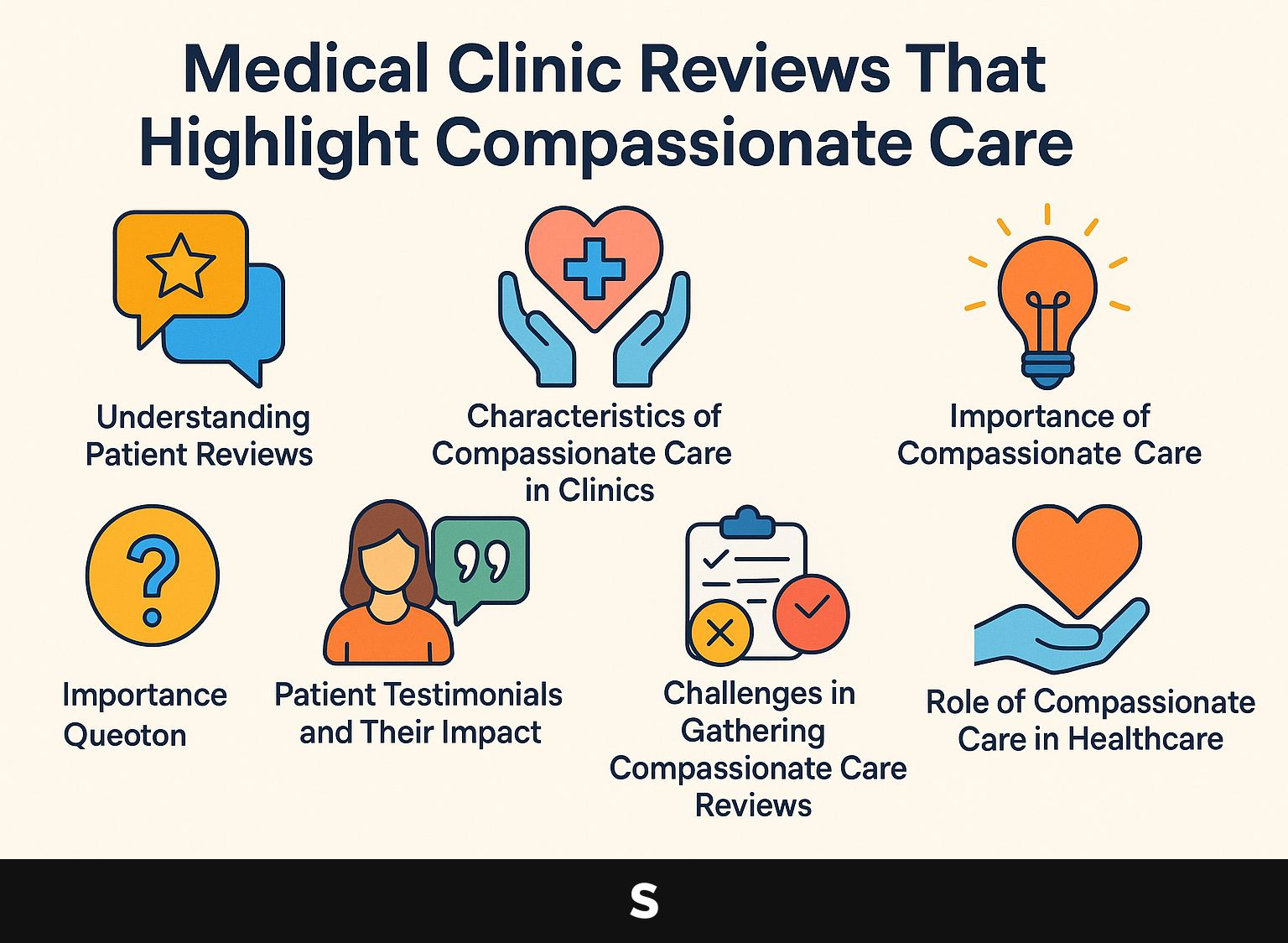
Compassionate care in healthcare is essential. Patients are more and more looking for medical clinics where they feel understood and cared for above all else. This article looks at how patient reviews highlight the core of caring treatment, showing healthcare workers who pay attention and respond with real empathy.
We will look at findings from qualitative research and talk about ways to clearly show these values, which will help clinics gain trust and improve their reputation in a competitive system.
Key Takeaways:
- Kind treatment is an important part of keeping patients happy. It includes really listening to them, following up in ways that suit their individual needs, and having a staff that shows they care.
- Patient reviews greatly affect a clinic’s reputation, so it’s important to promote positive comments and handle negative reviews well.
- Caring treatment improves patient outcomes and builds trust, positively impacting the healthcare system. Medical training can promote this approach.
- Medical Clinic Reviews That Highlight Compassionate Care
- Understanding Patient Reviews
- Characteristics of Compassionate Care in Clinics
- Importance of Compassionate Care
- 1. Why is compassionate care essential for patient trust?
- 2. What are the long-term benefits of compassionate care for clinics?
- 3. How can clinics effectively showcase their compassionate care in reviews?
- 4. What methods can clinics use to encourage patients to give feedback?
- 5. How can clinics respond to reviews to highlight their compassion?
- Patient Testimonials and Their Impact
- Challenges in Gathering Compassionate Care Reviews
- Future Trends in Patient Reviews
- The Role of Compassionate Care in Healthcare
- 1. How does compassionate care influence overall health outcomes?
- 2. What are the broader implications of compassionate care for healthcare systems?
- 3. How can medical education emphasize the importance of compassion?
- 4. How can continuous improvement be achieved in compassionate care practices?
- 5. What role does compassion play in healthcare ethics?
- Frequently Asked Questions
- 1. What is Spokk.io?
- 2. Why is it important for medical clinics to showcase compassionate care?
- 3. Can you give an example of a review that highlights compassionate care?
- 4. How does Spokk.io help clinics showcase compassionate care?
- 5. What other benefits can clinics gain from highlighting compassionate care?
- 6. Is there a specific type of medical clinic that can use Spokk.io?
Medical Clinic Reviews That Highlight Compassionate Care
Compassionate care is important in medical clinics, as shown by patient stories about Dr. Williams, who spends time getting to know her patients, which improves their view of the care they receive.
1. What constitutes compassionate care in a medical clinic?
Kind and attentive care involves listening closely and offering individual attention. These are important for building a supportive healthcare setting.
Active listening involves fully concentrating on what the patient is saying, which builds trust and rapport. For example, healthcare workers can improve this skill by practicing with tools like role-playing situations or listening exercises where they think about their responses.
Personal interactions, such as remembering a patient’s preferences or concerns, can significantly improve their comfort and satisfaction. Studies indicate that this approach can lead to a 25% increase in patient compliance with treatment plans. Including these elements helps build patient relationships and leads to better health results.
2. How do patient experiences shape perceptions of care?
When patients share their experiences, it greatly affects how others view the quality of care. This shows how a clinic’s method can make an impact on potential patients.
Studies show that 72% of patients consult online reviews before selecting a healthcare provider. Personal stories about compassionate care or successful outcomes can draw in new patients and build trust.
Clinics can actively encourage testimonials by implementing follow-up surveys post-treatment, utilizing platforms like Google Reviews or Healthgrades. Posting these stories on social media makes the clinic more relatable and helps it connect with more people.
A video of a patient discussing their experience can provide helpful information, helping future patients feel comfortable reaching out to the clinic. Worth exploring: Expert Tips for Mastering Customer Feedback Analysis and Utilization to enhance how testimonials are gathered and used.
Understanding Patient Reviews
Learning the details of patient reviews is important for clinics to improve their reputation and get new patients, as these reviews show important patient opinions on the care they received. If interested, clinics can gain further insights by exploring our expert tips for mastering customer feedback analysis and implementing best practices.
1. What are the key elements of a helpful medical review?
Key elements of a helpful medical review include specific details about the patient’s experiences, including staff interactions and the quality of care received, which inform potential patients’ choices.
For an effective review, be clear, stay on topic, share your thoughts, and give detailed examples. Start by briefly describing your treatment, highlighting particular moments with the staff that stood out, such as a nurse’s attention or a doctor’s thorough method.
Show how good the care is by giving examples, such as quick responses or treatment plans made to fit individual needs. It’s important to share your feelings, talking about how the experience impacted you-this can connect strongly with others in similar situations.
2. How do reviews impact a clinic’s reputation?
Reviews are important for a clinic’s reputation. High ratings can lead to more trust and involvement from patients, which is important for the clinic to stand out in a busy market.
Research indicates that 84% of patients trust online reviews as much as personal recommendations.
For instance, a dental clinic that improved its average rating from 3.5 to 4.8 stars saw a 30% increase in new patient appointments after enhancing its patient care practices.
Another example is a children’s clinic that started using a feedback system. This let them respond right away to what patients were worried about, which really improved their ratings.
Clinics should work on giving patients a good experience and ask happy patients to write reviews to improve their online reputation.
3. What role do emotional experiences play in reviews?
Emotional experiences significantly affect how patients convey their reviews, often leading to a heightened emphasis on the quality of interactions and feelings of empathy received during their care.
For instance, patients often highlight moments when staff went the extra mile, such as nurses who took time to listen or doctors who explained complex procedures in simple terms.
These thoughtful exchanges help patients feel better and influence reviews on sites like Healthgrades and Yelp. Tools like sentiment analysis can further reveal how specific phrases about compassion correlate with higher scores, allowing healthcare providers to identify and replicate successful engagement strategies.
Emphasizing emotional intelligence training for staff can, therefore, lead to improved patient narratives and ratings.
Characteristics of Compassionate Care in Clinics
Important features of caring treatment include paying close attention, customized follow-ups, and a supportive clinic setting, which together increase patient happiness and results.
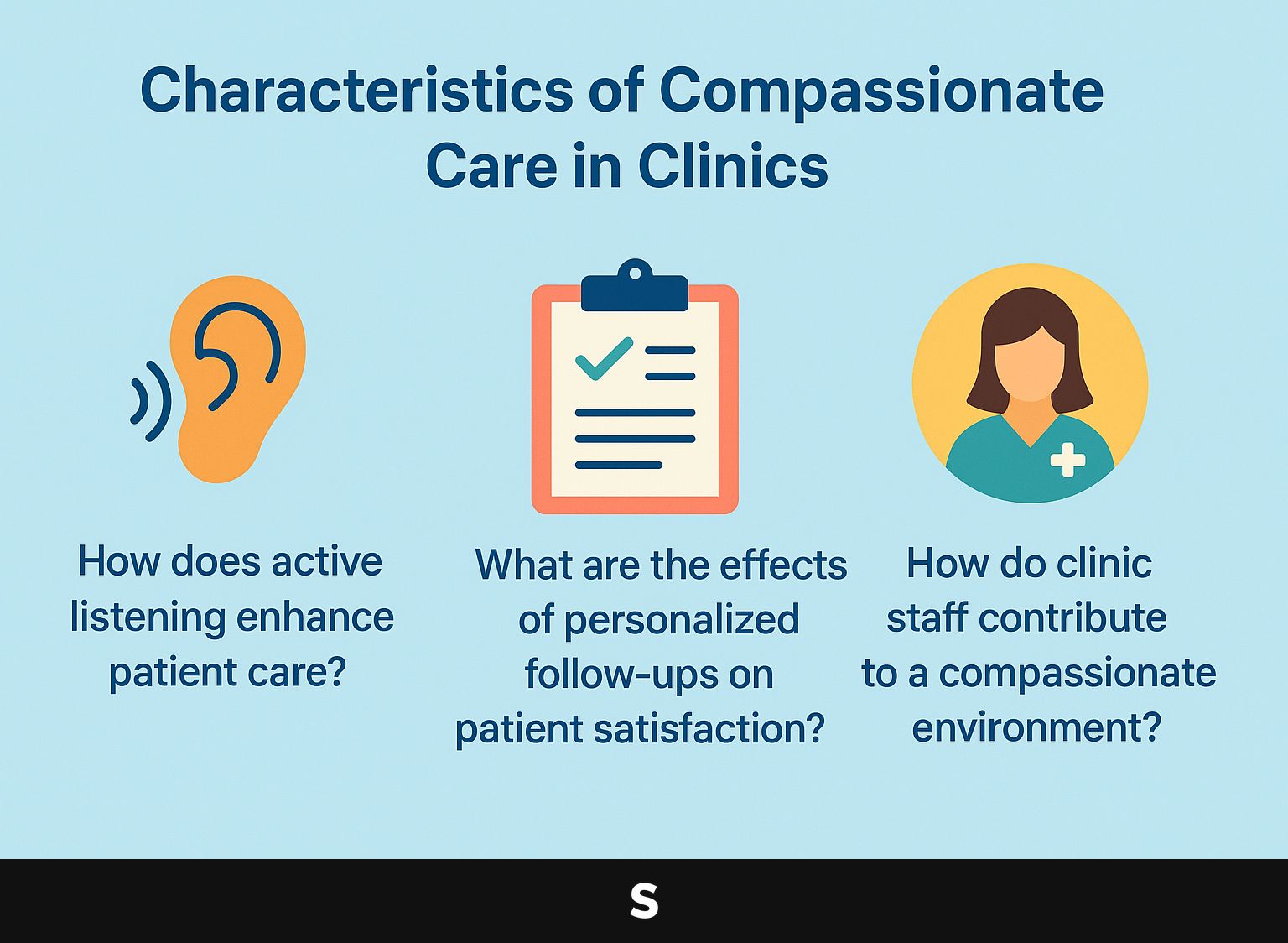
1. How does active listening improve patient care?
When clinicians really listen, it helps them connect better with patients. This helps them know what the patients need and leads to better care results.
To improve active listening skills, healthcare providers can join specific training programs like the Active Listening Workshop by the Institute for Healthcare Communication or use tools like Miller’s Listening Skills Training.
Statistics show that improvements in active listening can increase patient satisfaction by up to 30%, highlighting its importance.
Integrating reflective listening techniques during patient interactions encourages a collaborative dialogue, further ensuring that patients feel heard and valued in their care process.
2. How do individual follow-ups impact patient satisfaction?
Following up with patients in a personalized way significantly boosts their satisfaction. This approach shows that a clinic cares about the patient’s continued care and attention after their initial appointment.
Clinics can use tools like SimplePractice or Athenahealth to manage patient communications automatically for personalized follow-ups.
- Begin by creating automatic notifications for patients to follow up after their appointment, preferably within 48 hours, to inquire about their recovery or how satisfied they are.
- Check response rates and count positive feedback to notice clear improvements in patient satisfaction scores. These scores usually rise by 15-20% when follow-ups are regular and customized.
3. How do clinic staff contribute to a compassionate environment?
Clinic staff are essential in creating a caring atmosphere, where working together and good relationships greatly improve how patients feel.
To nurture a compassionate culture, training sessions should focus on active listening and empathy. For instance, role-playing scenarios can help staff practice responding to patient emotions effectively. Encourage regular team meetings where healthcare professionals share experiences and discuss emotional challenges.
Implement tools like feedback forms to allow patients to share their feelings about care received, which can highlight areas for improvement.
By always focusing on clear communication and support, teams can build a working environment that meets patient needs and improves staff morale.
Importance of Compassionate Care
Being kind to patients is important for gaining their trust. This trust is key for clear communication and achieving good outcomes in healthcare.
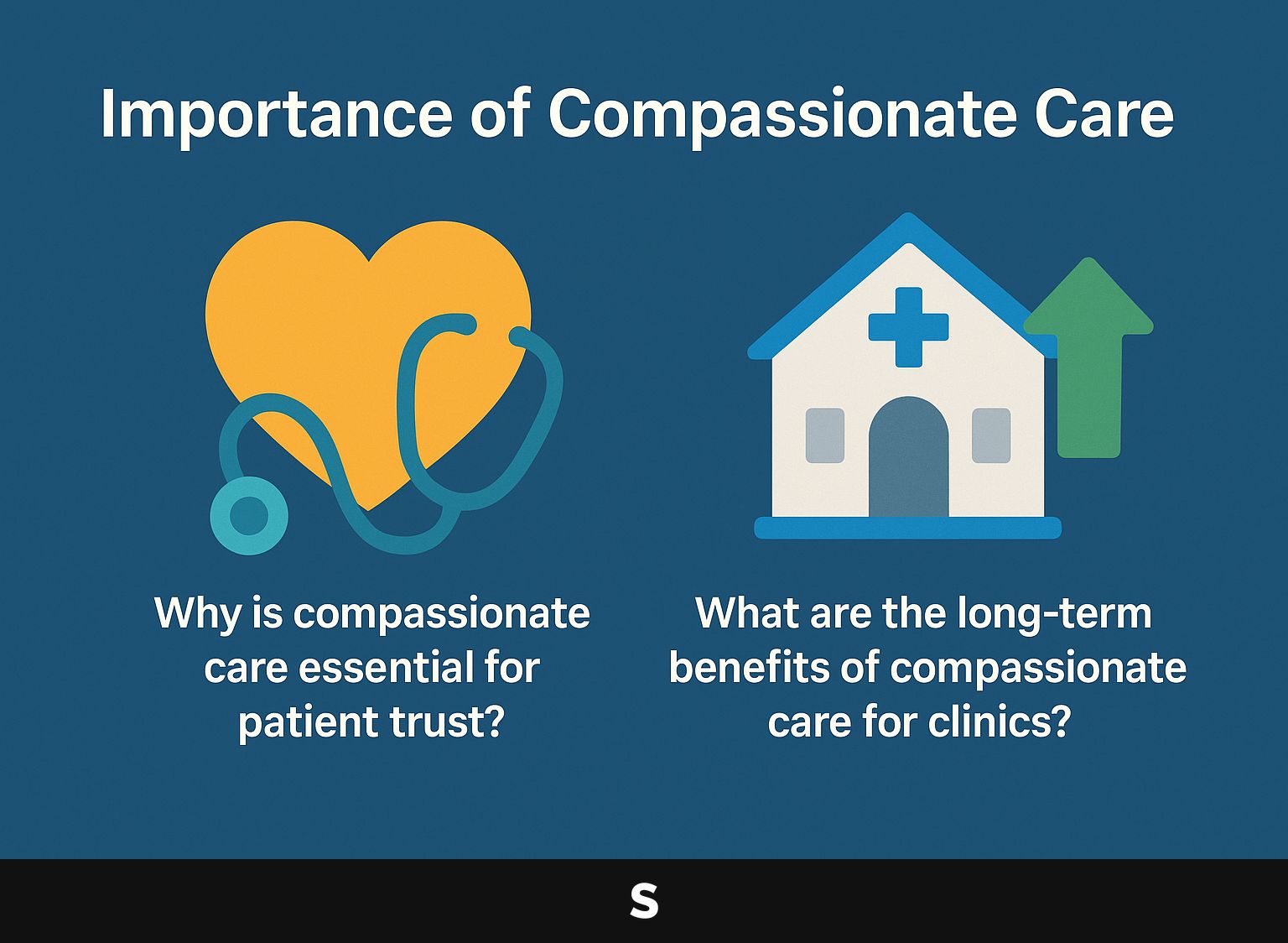
1. Why is compassionate care essential for patient trust?
The foundation of patient trust lies in compassionate care, which strengthens the clinician-patient relationship and encourages open communication regarding health concerns.
When patients feel listened to and looked after, they are more likely to provide important details about their symptoms and what they prefer for treatment.
For instance, a study found that patients who trust their doctors are 30% more likely to adhere to prescribed treatment plans. An example of this situation can be seen in cancer treatment, where a caring oncologist who truly listens can build trust, leading to better patient cooperation in difficult chemotherapy schedules.
Building trust improves treatment results and creates a more satisfying healthcare experience.
2. What are the long-term benefits of compassionate care for clinics?
Clinics that prioritize compassionate care reap long-term benefits, including increased patient loyalty and improved clinical outcomes over time.
Research shows that clinics with high patient satisfaction scores see a retention rate increase of 10-20%. Using methods like paying close attention, teaching staff to understand others’ feelings, and creating individual care plans can build this environment.
Tools like PatientTouch can improve communication, ensuring patients feel heard. Clinics that use these techniques frequently see an increase in patient referrals, which greatly improves their financial results.
Data suggests that for each point increase in satisfaction ratings, clinics may observe a corresponding revenue increase of 5-10%, underscoring the financial benefits of compassionate care.
3. How can clinics effectively showcase their compassionate care in reviews?
Clinics can effectively showcase compassionate care by encouraging patients to share specific narratives that emphasize their positive experiences and the emotional support received.
To solicit detailed patient stories, use structured feedback forms that ask open-ended questions like, “What aspect of your care made a difference to you?” and “Can you describe a moment that stood out during your treatment?” Make it easy for patients to contribute by providing an online form or a dedicated email.
Once collected, integrate these narratives into marketing materials, featuring quotes or stories in brochures, on social media, or within your website. Real people’s stories make upcoming patients feel understood and can build trust.
4. What methods can clinics use to encourage patients to give feedback?
Clinics can use various ways to collect patient opinions, ensuring they receive helpful information to make their services better. One effective approach is to send follow-up emails shortly after appointments, thanking patients for their visit and inviting them to share their thoughts through a brief survey.
Try to keep surveys under five minutes to respect their time. Think about giving incentives such as discounts on upcoming visits or chances to win prizes to motivate involvement.
The key is to time these requests when the experience is fresh in their minds, which will likely lead to more thoughtful and honest responses.
5. How can clinics respond to reviews to highlight their compassion?
Clinics can respond to reviews by showing empathy and care, which can confirm their dedication to compassionate treatment. To engage with reviews, clinics should first acknowledge the specific concerns raised.
For positive reviews, express gratitude with a message like, “Thank you for your kind words! We’re thrilled that you had a great experience!”
For negative feedback, use a response such as, “We’re sorry to hear you felt this way. Your feedback is very important to us, and we want to fix this problem. Please contact us at [contact information].”
This approach highlights that you care about patient feedback and builds trust in your clinic’s dedication to getting better.
Patient Testimonials and Their Impact
Patient experiences strongly support the quality of care provided and greatly affect new patient’s choices when choosing a clinic.
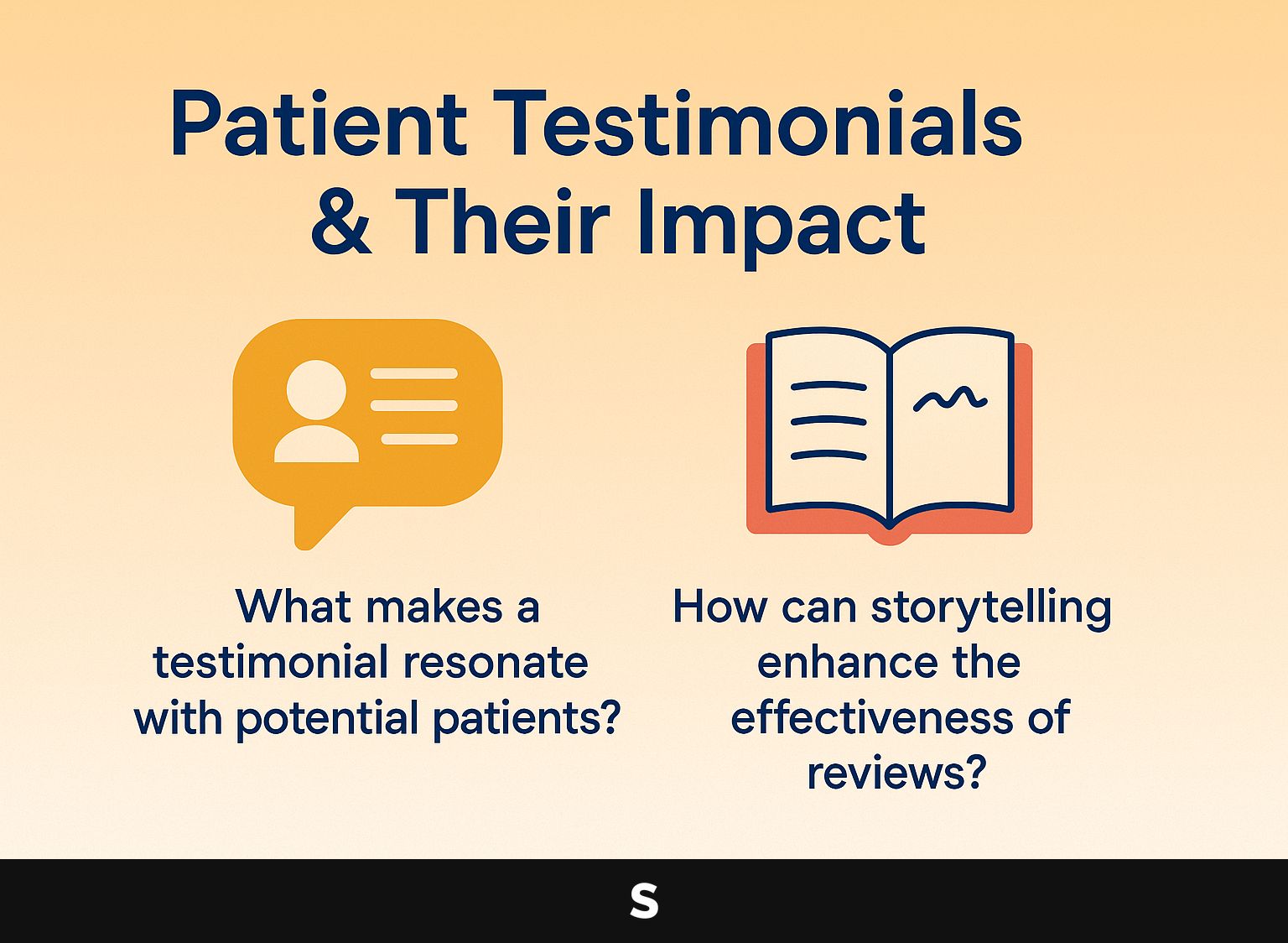
1. What makes a testimonial connect with possible patients?
Testimonials connect with potential patients when they share stories that show both the successful treatment and the caring support received.
To create effective testimonials, encourage patients to focus on specific elements. Ask them to explain the problem they encountered, how your care made a difference to them, and how it made them feel better.
Use specific questions such as, ‘What was your experience before treatment?’ or ‘How did our team help you during your recovery?’ Consider using tools like Google Forms or SurveyMonkey to collect feedback easily.
Highlight the best responses on your website and social media to build trust and showcase the human side of your practice.
2. How can storytelling make reviews more effective?
Storytelling improves reviews by building a story that emotionally links with readers, showing how compassionate care affects their lives.
Clinics can use storytelling by asking patients to talk about their experiences using specific questions. For instance, ask patients to describe a moment when they felt particularly cared for or how the staff addressed their concerns.
Sharing these stories highlights the clinic’s values. Use platforms like Google My Business or Healthgrades to gather and display these stories clearly. Think about using video testimonials because they often feel genuine and connect strongly with potential patients.
These practices build trust and highlight a focus on patient care effectively.
Challenges in Gathering Compassionate Care Reviews
Getting honest reviews that show the kind care given by clinics can be hard because patients often don’t want to share their experiences in public.
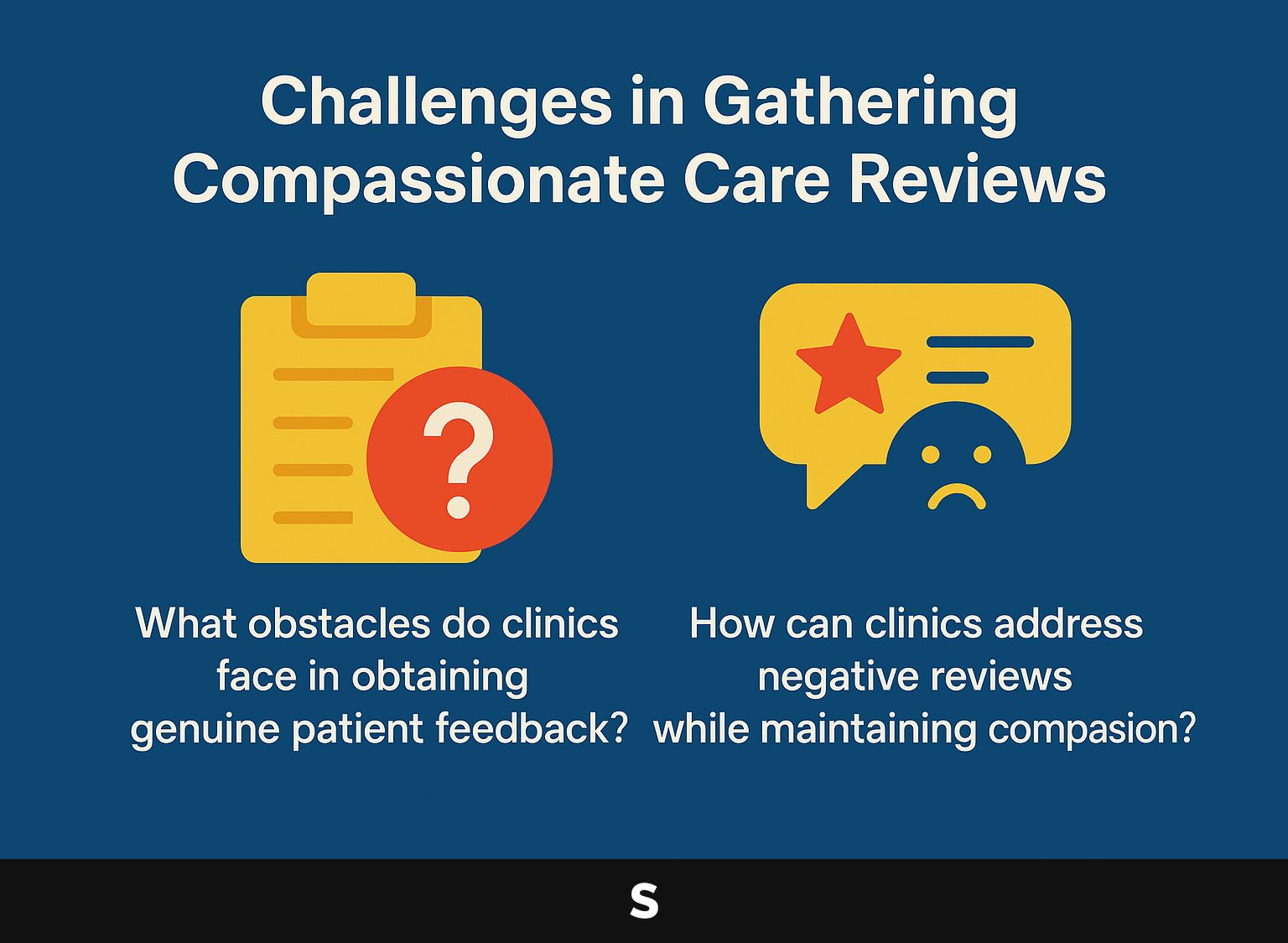
1. What obstacles do clinics face in obtaining genuine patient feedback?
Clinics often encounter obstacles such as patient reluctance and lack of awareness about the importance of feedback, hindering their efforts to gather genuine reviews.
To address these barriers, clinics can implement strategies like establishing a culture of open communication and ensuring a safe, judgment-free environment.
For example, during consultations, practitioners can directly ask for feedback by saying, ‘Your comments help us get better.’ Using anonymous surveys through platforms like SurveyMonkey can promote honesty.
Follow-up calls or texts after appointments can reinforce the importance of their input. Encouraging patients to share their thoughts by offering rewards like discounts on upcoming appointments can increase their involvement in giving feedback.
2. How can clinics address negative reviews while maintaining compassion?
Handling negative reviews with kindness is important for keeping a good clinic reputation and showing dedication to patient care.
Start by acknowledging the patient’s feelings; for instance, you might say, ‘We’re sorry to hear about your experience and appreciate your feedback.’
Next, offer a solution or invite them to discuss their concerns privately. For example, ‘Please contact us directly at [phone number] so we can make things right.’
Follow up with a thank you message if they engage positively afterward, maintaining a relationship that shows you value their input. This method helps regain trust and improves your clinic’s reputation.
Future Trends in Patient Reviews
New technologies are reshaping patient reviews, making it easier for people to share their experiences and helping clinics respond to feedback.
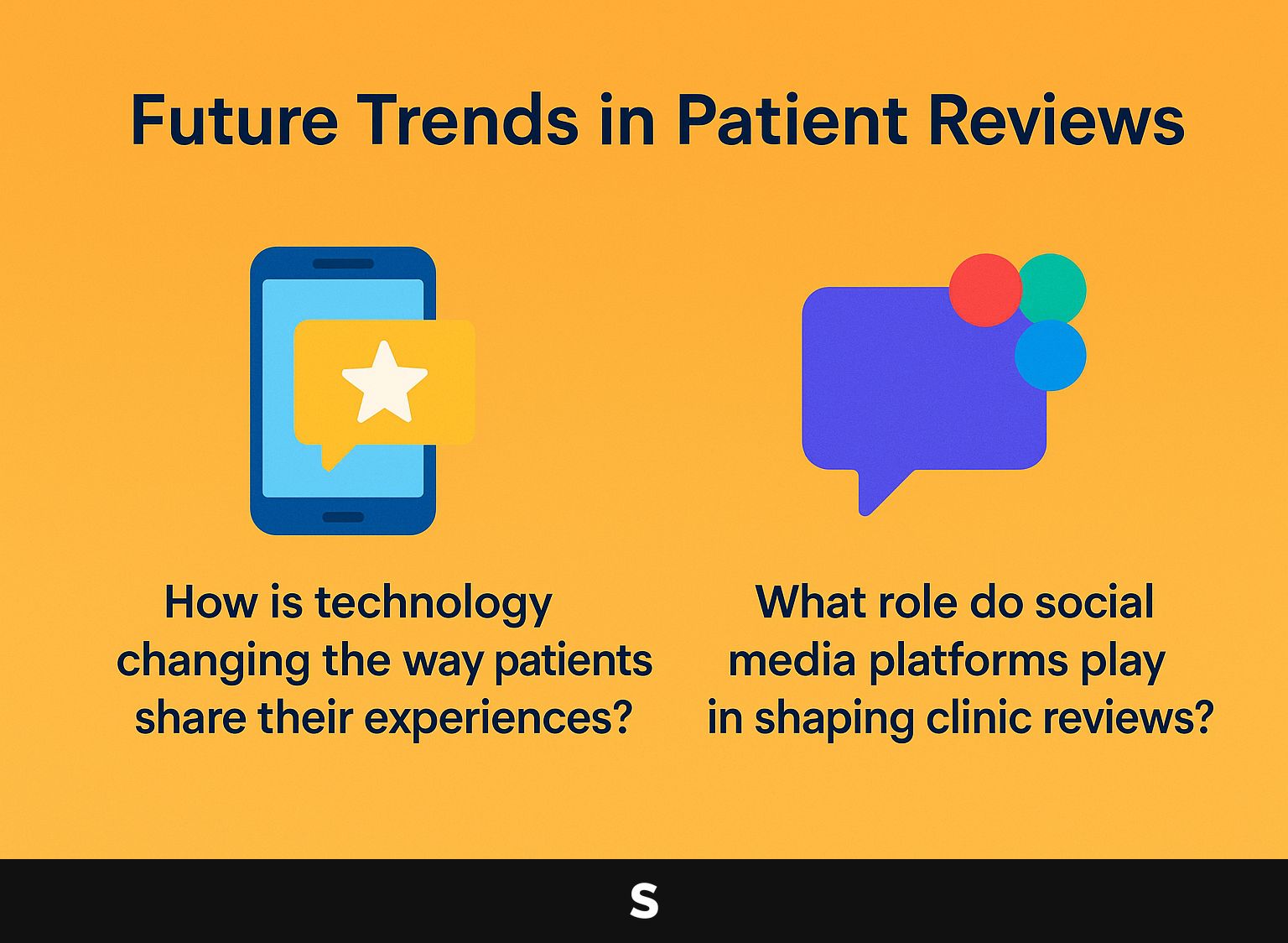
Technology is changing the way patients talk about their experiences. Social media and review websites offer new ways for them to give feedback.
Mobile apps like MyChart help patients stay involved by letting them give instant feedback directly through the app. Using services like SurveyMonkey, healthcare providers can send custom surveys after appointments, allowing patients to easily provide feedback.
Platforms such as Healthgrades and Zocdoc have popularized patient reviews, offering both feedback and new patient referrals.
By using these tools well, healthcare facilities can create a more responsive setting for patients, which will improve the quality of care and make patients happier.
Social media platforms play a significant role in shaping clinic reviews, allowing patients to share their experiences widely and influencing potential patients’ perceptions.
To make the most of this situation, clinics should actively interact with patients on social media by replying to reviews and comments.
Use tools like Hootsuite to monitor mentions and manage posts across multiple platforms. Motivate happy patients to post their good experiences online by giving them rewards, like discounts for their next visit.
Regularly posting useful content, patient reviews, and behind-the-scenes looks can help build a feeling of community and trust, improving the clinic’s reputation.
The Role of Compassionate Care in Healthcare
Caring for people with kindness is important for individuals and also greatly influences how healthcare systems work and how well they perform.
1. How does compassionate care influence overall health outcomes?
Compassionate care has been shown to positively influence overall health outcomes by enhancing patient satisfaction and adherence to treatment plans.
Studies indicate that compassionate approaches can improve recovery rates. For instance, a 2021 research project published in the Journal of Patient Experience found that patients treated with higher levels of empathy reported a 30% increase in treatment adherence.
The BMC Health Services Research journal showed that healthcare facilities using training focused on compassion saw a 20% increase in patient satisfaction scores, which resulted in better patient retention.
Using practices such as active listening and customized care plans can greatly improve how patients participate in their care and the results of their treatment.
2. What are the broader implications of compassionate care for healthcare systems?
The implications of compassionate care extend beyond individual clinics, impacting healthcare systems by promoting quality, efficiency, and patient centered practices.
Healthcare organizations such as the Cleveland Clinic and Mayo Clinic have adopted caring treatment methods, experiencing noticeable advantages. For instance, Cleveland Clinic trains staff in empathy and communication, resulting in improved patient satisfaction scores and reduced readmission rates.
Similarly, Mayo Clinic integrates compassionate interactions into their care protocols, enhancing trust and adherence to treatment plans. Focusing on empathy in how we interact with patients makes their experiences better and helps build a healthier community. This approach can reduce healthcare costs and improve the quality of care.
3. How can medical education emphasize the importance of compassion?
Integrating compassion training into medical education is essential for developing healthcare professionals who prioritize empathetic patient interactions.
To improve compassion in medical training, programs can include role-playing exercises where students practice giving difficult news with empathy.
Workshops on emotional intelligence teach students to identify their feelings and see things from patients’ viewpoints. Notably, programs like Stanford’s Empathy Course have successfully integrated such elements, improving students’ patient relationships.
Writing about their experiences can help students understand themselves better and connect more effectively to their clinical work, making them emotionally resilient as they begin their careers.
4. How can continuous improvement be achieved in compassionate care practices?
Achieving continuous improvement in compassionate care practices requires ongoing patient feedback and regular training for healthcare professionals.
To implement effective feedback loops, consider utilizing patient surveys after each visit, focusing on their emotional experiences. Tools like SurveyMonkey can facilitate this process.
Organize empathy training for staff every two months. Use role-playing to help them better relate to real-life situations. Set aside time in team meetings to go over feedback and discuss concrete steps based on the collected data.
This mix of organized feedback and focused training creates a setting where care improves steadily, resulting in better results for patients.
5. What role does compassion play in healthcare ethics?
Compassion is a cornerstone of healthcare ethics, ensuring that patient rights are respected and that care is delivered with dignity and empathy.
It influences medical decisions by encouraging healthcare workers to closely watch patients, considering their emotional and mental needs along with physical symptoms.
Ethical guidelines, like the ideas of doing good and not causing harm, highlight the need for kindness in supporting patients’ ability to make their own choices and understand information. For example, the AMA’s Code of Medical Ethics encourages physicians to provide compassionate care that respects patient choices.
Integrating compassionate practices can significantly improve patient satisfaction, adherence to treatment, and overall health outcomes.
Frequently Asked Questions
1. What is Spokk.io?
Spokk.io is a platform that helps medical clinics highlight patient care and positive reviews.
2. Why is it important for medical clinics to showcase compassionate care?
Caring for patients with kindness is key to making their experience better and gaining their trust.
3. Can you give an example of a review that highlights compassionate care?
“Dr. Williams actually listens! She spent 30 minutes listening to my symptoms, ordered the right tests, and personally followed up with the results. The staff works quickly without hurrying. Finally found a practice that treats patients as people, not numbers.”
4. How does Spokk.io help clinics showcase compassionate care?
Spokk.io provides a platform for clinics to share reviews and testimonials that highlight their compassionate care and patient-centered approach.
5. What other benefits can clinics gain from highlighting compassionate care?
By showcasing compassionate care, clinics can attract more patients and build a strong reputation within the community.
6. Is there a specific type of medical clinic that can use Spokk.io?
No, Spokk.io is open to all types of medical clinics that want to showcase their compassionate care and positive reviews.


